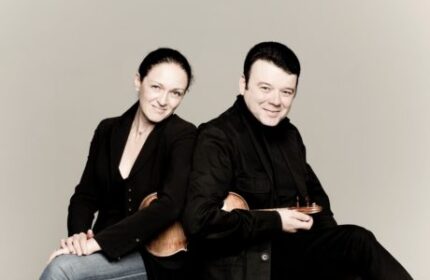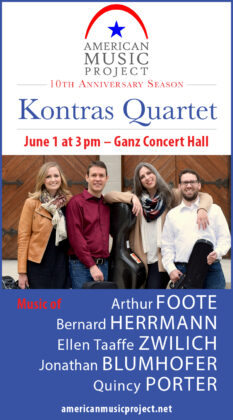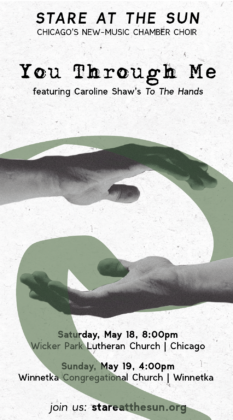North Shore Chamber Fest closes with family affair, à la française

Music is, more often than not, a communal act. The most elemental performances indelibly remind one of the true depth of music’s ability to bring people together across contents and generations, as it has for thousands of years.
That convivial spirit was present in the delightfully eclectic program that closed the North Shore Chamber Music Festival’s 2023 season at the Village Presbyterian Church in Northbrook on Saturday night.
In keeping with a festival-long celebration of French music, the evening opened with the Clarinet Sonata of Francis Poulenc, a member of the Les Six composer collective. Clarinetist Ilya Shterenberg and pianist Janice Carissa set an impassioned tone in the sonata’s fiery opening, which immediately set the pair trading angular interlocutions with polished ease.
The duo evinced a capacity for wide-spanning expression throughout the entire opening movement. As the sizzling introduction gave way to a tender interlude, Shterenberg’s lines overflowed with tenderness; each of the alternately declamatory and soft-spoken iterations of the same phrase was imbued with a sense of distinctive character. Even in the recapitulation, the fraught principal theme was cast in a new light.
The second movement, more subdued and plaintive still, was carried out thanks to the supple, undulating motion of Carissa’s capable accompaniment. Aside from a handful of odd squawks in the upper register, Shterenberg was a model of technical and expressive poise, plumbing the utter limits of his instrument’s dynamic range throughout the mournful Romanze.
Carissa’s fine contributions were most heightened in the closing Allegro, wherein the piano leapt from the accompanying texture to join the clarinet in the radiant peal of bell-like tones. The audience’s enthusiastic reception garnered an encore: the pearlescent Arabesque by fellow Les Six member Germaine Tailleferre, a fitting coda to the opulent opener.
As is the festival’s annual tradition, the program spotlighted the recipient of the Arkady Fomin Scholarship recipient, awarded to emerging young artists. That honor this year was bestowed upon violinist Hina Khuong-Huu, who was joined Carissa — herself a past scholarship honoree — to deliver Darius Milhaud’s Le Bœuf sur le toit.
Milhaud’s kaleidoscopic rondo was conceived as musical accompaniment to a Charlie Chaplain silent film and bears up to the zany hallmarks of that artist’s work. The charismatic pair’s similarly offbeat introduction translated into equally spunky advocacy in their performance.
Khuong-Huu’s muscular execution of the showpiece’s swirling arsenal of double-stops, spiccato, and other technical fireworks was tempered by a silky tone that lent elegance to even the most virtuosic displays. Likewise, Carissa, ever a game recital partner, provided brawny accompaniment to lock in Milhaud’s syncopated, Brazilian-inflected grooves.
The performance was not without lapses in ensemble coordination, as the pair’s fervor occasionally overtook clarity in some of the interior episodes. The two honed that fervor as the piece accelerated toward its close, regaining rhythmic and interpretational acuity in time for a dazzling finish.
To close the program’s first half, North Shore’s artistic director and violinist Vadim Gluzman called upon his string colleagues — violist Atar Arad, alongside violinist Gershon Gerchikov, violist Jan Grüning, and cellist Amit Even-Tov of the Ariel String Quartet to deliver the U.S. premiere of the string sextet Leopards by Turkish composer Fazil Say.
Like the Milhaud, Leopards is cinematic in its sense of drama and exploration of color. But where the former was tailored to suit silent films, Say’s work, with its propulsive, asymmetrical meter and modal tonality, would be at home underscoring a contemporary thriller.
The musicians committed to the piece’s rhythmic language of snap pizzicato, sinuous ostinati, and instruments smacked with open hands, to great coloristic effect. This was no compendium of extended techniques, however, but an exquisitely assembled collage of gnarled textures, which in turn enfolded moments of melodic beauty; an austere duet by cellists Even-Tov and Mark Kosower offered a beautiful reprieve from the knotted drama.
Cesar Franck’s Piano Quintet anchored the program’s latter half. In the sprawling Molto moderato, Gluzman, in the first violin chair, may have played the protagonist in sweetly unfurling themes, but it was the lucidity and propulsiveness of pianist William Wolfram’s playing that gave narrative heft to the first movement’s form.
Throughout the work, the string players for this work brought distinctive tonal color to their soloistic contributions — Kosower’s clear and plangent, Arad’s dark and enveloping — but the coalescence of these varied hues into a rich unison all but assured the potency of Franck’s searching, elongated melodies.
One of the work’s standout moments arrived toward the end of the second movement, as a swoony, lilting groove, kicked off by the piano, blossoms into an expansive string ostinato. As the clouds finally part, a lovely duet by Kosower and violinist Khuong-Huu pierces the texture like a sunbeam, lighting the path back to the final restatement of the theme.
To close the evening, all the assembled forces returned to the stage to perform Eugen Doga’s waltz from the film My Sweet and Tender Beast, arranged for the sprawling, 13-piece group by Lev Zhurbin. Among their ranks was clarinetist Shterenberg; members of the Ariel Quartet; and festival executive director Angela Yoffe, who joined Wolfram and Carissa in a piano six-hands part.
These being largely world-class musicians, the technical ability of the performance was guaranteed. But it was the family-reunion presentation of this sober sendoff, as intimate and affecting as a benediction over family dinner, that proved the most fitting encapsulation of this festival’s raison d’être.
Posted in Performances



